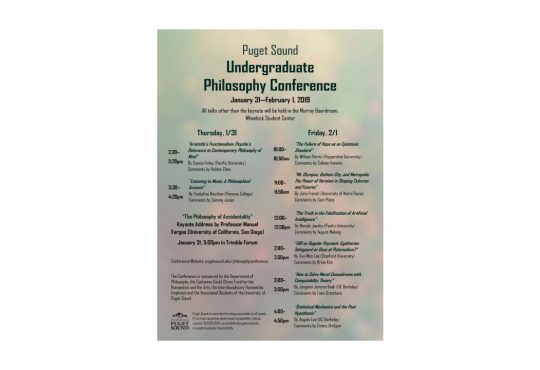The Philosophy and Political Theory film series commenced last Wednesday, Sept. 25 with the 1979 film Apocalypse Now, an adaptation of Joseph Conrad’s 1899 novel Heart of Darkness. The screening—followed by a discussion with professors Ariela Tubert, Justin Tiehen and Alisa Kessel—began this year’s film series, themed, Apocalypse and Dystopia.
For those unfamiliar with Apocalypse Now or Heart of Darkness, the movie tells the story of U.S. Army Captain Benjamin Willard, who has been sent on a mission to kill the rogue and possibly insane Colonel Kurtz.
Along the way, he encounters many situations that cause him to further lose his faith in humanity, as when his crew stops to surf at a Vietnamese beach as it is being struck by napalm.
Willard also learns more about Kurtz by reading his various files, making him less inclined to kill Kurtz and more inclined to distrust the army.
Apocalypse Now was received with critical acclaim upon its release, given a 99 percent “Certified Fresh” rating by the online movie reviewer Rotten Tomatoes.
It has been thoroughly analyzed for its psychological and philosophical themes and has had a great cultural impact that has lasted since its release.
The movie itself is quite dark, unsettling and almost surreal with its unusual cinematography. Being a fairly grim war movie, it seems like an ideal place to start for the equally grim theme of this year’s film series.
The discussion following the movie centered on how exactly the film relates to the theme of Apocalypse and Dystopia.
Obviously, the movie has one of these themes in its title; moreover, in the movie, there was a brief scene showing the graffiti “Our Motto: Apocalypse Now” in the place where Willard eventually finds Kurtz. However, there appears to be more to the title and the overall theme than this literal interpretation.
“This scene is not dystopic,” Kessel said in response to a question posed regarding the movie’s theme, mainly because “there is no utopia to compare to the dystopia.”
With this logic, the entire movie takes place in one great dystopia, making it more apocalyptic than anything else.
This is also characterized by the “corruption of morals” and that “there are no principles,” Tubert said. Indeed, there seems to be a theme of the destruction caused by lies throughout the movie, especially as Willard learns more about Kurtz than the army would probably like him to know.
“It’s not just that the good doesn’t always win,” another student said, concerning the lack of morality presented in the setting of the movie, “it’s that the good never wins.”
“The darkness is victorious,” Tiehen agreed.
“There’s no morality in the military,” Kessel commented, and noted how the crew becomes “less ordered as it goes up the river,” the river being the Nung River in Cambodia.
Although, it could be interpreted that there is not only a lack of good, but rather a lack of both right and wrong.
“There is no good and evil anymore,” Tubert said. “It’s all chaos.”
SPOILER ALERT: When Willard finally finds Kurtz among his native followers—many of whom he has beheaded and murdered—he kills him. Before Kurtz dies, as he does in the book, he whispers, “The horror. The horror.” What is this horror? Whatever it is, it was enough to make Kurtz go from being a model U.S. soldier to a crazed murderer of the natives.
What the movie seems to suggest is something very dark about the reality of humanity. Kessel called this the “human heart of darkness.”
“If that’s true,” Kessel continued, “then the human condition is profoundly corrupt.”
Many of us may not want to believe in a pessimistic viewpoint like this one, as true as it may be. But perhaps this isn’t exactly what the movie is suggesting.
“If you put human beings in certain circumstances, there will be apocalypse,” Tubert argued, meaning that humans are not inherently amoral, but some circumstances may warrant amorality.
“The strength of will is necessary to overcome morality,” she continued. A war is certainly a place in which morality can become mangled and distorted, and maybe that’s the story Apocalypse Now is trying to tell: a cautionary tale.
At any rate, the fact that the themes of this movie were still relevant 80 years after Heart of Darkness was written is something to consider, as is the fact that we can still consider these themes relevant even over a hundred years later.
The next movie in the Philosophy and Political Theory film series, Bellflower, will be shown on October 30 in the Rausch Auditorium.




